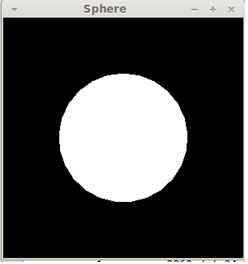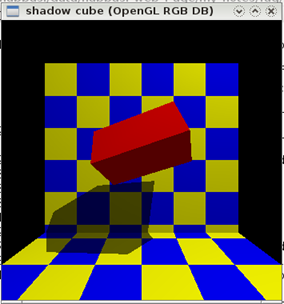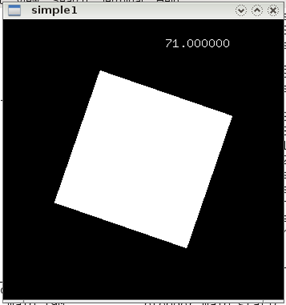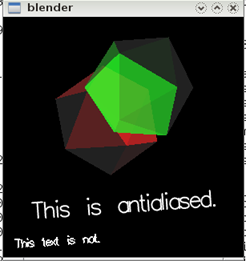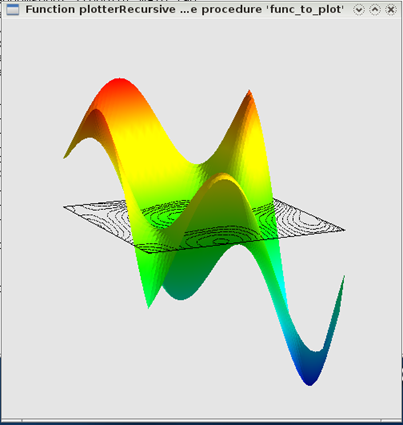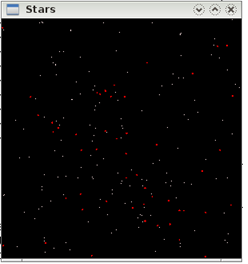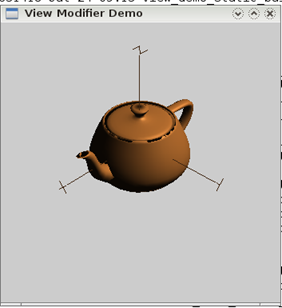-
-
HOME
-
-
PDF
my Fortran web page
September 8, 2023 Compiled on September 8, 2023 at 9:45am
Contents
1 using OPENGL with Fortran
1.1 source code
This zip file contains the source code and examples and scripts needed to build client Fortran
program using the Fortran 2003 openGL binding
nma_fortran_opengl.zip
The above is a slight modification based on the original binding located at
http://www-stone.ch.cam.ac.uk/pub/f03gl/index.xhtml
based on work by Anthony Stone, Aleksandar Donev and the original f90 open GL binding by
William F. Mitchell.
What I did is document the F2003 openGL binding with diagrams below, made small code
changes to make build with F2008 and build the examples in it as static to make it easier for
someone to download and run without having to have openGL installed on their Linux. This was
done for Linux only not for windows. Below is more description of my changes to the
binding.
The executables of the examples are in the above zip file. I added .exe to the names just to make
it more clear. These are linux executables, not windows.
1.2 description
This describes how to use 2003 opengl with Fortran and few examples I wrote using this
API as I learning openGL. First a description of the build structure is given. This
is the description based on my own layout of the official binding obtained from
http://www-stone.ch.cam.ac.uk/pub/f03gl/index.xhtml
I have made small changes to the file naming (mixed case changed to all lower case) since it is
less confusing this way, as Fortran is case insensitive and now the file names and the module
names all match.
In addition, I broke one module file into 2 files so that there is 1-1 correspondence with file name
and module name.
Some code changes are made to the binding files to make them build with std=f2008.
The description below reflects what I have in the above zip file not the original and official
Fortran 2003 openGL binding.
There are now 4 Fortran files that make up the Fortran 2003 binding, and one C file. They
are
- opengl_kinds.f90.txt generates opengl_kinds.mod, all other files USE this one.
- opengl_glu.f90.txt generates opengl_glu.mod
- opengl_gl.f90.txt generates opengl_gl.mod
- opengl_freeglut.f90.txt note: this generates opengl_glut.mod and not
opengl_freeglut.mod
- glut_fonts.c.txt generates glut_fonts.o only
This picture below shows the layout of the binding tree as I have it now (again, this is slightly
different naming from the official tar file)
$HOME/
|
|
fortran_binding/
|
|
opengl_freeglut.f90 (USE opengl_kinds) ---> opengl_freeglut.o
opengl_glut.mod
opengl_gl.f90 (USE opengl_kinds) ---> opengl_gl.o
opengl_gl.mod
opengl_glu.f90 (USE opengl_kinds) ---> opengl_glu.o
opengl_glu.mod
opengl_kinds.f90 ---> opengl_kinds.o
opengl_kinds.mod
glut_fonts.c --> glut_fonts.o
A client program needs to link against the 5 object files
opengl_glut.o, opengl_gl.o, opengl_glu.o, opengl_kinds.o, glut_fonts.o
And the client will contain USE opengl_gl, USE opengl_glut and USE opengl_glu in the source
to be able to access the functions provided by these bindings.
Therefore, a typical structure of a Fortran program that uses opengl will be as follows
CLIENT B I N D I N G
======== ====================================================
main.f90 opengl_gl.mod opengl_kinds.mod
+---------------------+ +----------------------+ +---------------------+
|program main |----->|MODULE opengl_glu | |MODULE opengl_kinds |
| USE opengl_gl | |USE opengl_kinds |---> | |
| USE opengl_glut | |..... | | |
| USE opengl_glu | +----------------------+ | |
| | opengl_gl.o | |
| implicit none | | |
| .... | opengl_glut.mod | |
| | +----------------------+ | |
|CALL glutInit() | |MODULE opengl_glut | | |
|CALL glLoadIdentity()|----->|USE opengl_kinds |---> | |
|CALL gluBeginCurve() | |..... | | |
| | +----------------------+ | |
| | open_glut.o | |
| | | |
| .... | opengl_glu.mod | |
| | +----------------------+ | |
| | |MODULE opengl_glu | | |
| |----->|USE opengl_kinds |---> | |
| | |..... | | |
| | +----------------------+ | |
| | open_glu.o | |
| | +---------------------+
|end program main | opengl_kinds.o
+---------------------+
glut_fonts.c
+---------------------+
|#include <glut.h> |
|... |
+---------------------+
glut_font.o
In the above diagram, the client program main.f90 needs to link to the above 4 object files
generated from the 4 Fortran files, and against the object file generated from the one C file
glut_fonts.o
The above shows the object files that needs to be linked against. In addition, one needs to link to
the opengl and glut and X libraries of course. For static linking, other libraries are
needed. Diagram below shows all libraries needed, and a script is including below to do
that.
The diagram below shows everything that is needed to compile and link against.
This assumes a Linux 32 bit system. This is based on Linux mint 32 bit. On different Linux
distributions or on 64 bit, the tree will can and will look a little different depending on the
distribution.
To compile the C file glut_fonts.c the file GL/glut.h is needed.
In the diagram below it is assumed that main.f90 is located in your own folder, say $HOME/src
and that the Fortran opengl binding files are located in $HOME/fortran_opengl.
The following diagram shows all the files needed to build an executable as shared or static. This
is the layout on Linux 32 bit (Linux Mint 13)
/
|
usr/
|
|
+---------------------------+----+---------+-----------------------+
| | | |
$HOME/ /include /lib gnat/
| | | |
| | | lib/
| | | |
| | | libstdc++.so(.a)
| | |
| | |
+-------------+ | +----------------+---------------+
src/ fortran_opengl/ | | | |
| | GL/ gcc/ i386-linux-gnu/ |
| | | | | libglut.so(.a)
main.f90 opengl_freeglut.f90 | i686-linux-gnu/ +-------------+
main.o opengl_freeglut.o | | | |
opengl_glut.mod glut.h | mesa/ |
glu.h | | |
opengl_gl.f90 gl.h | libGL.so(.a) libGLU.so(.a)
opengl_gl.o freeglut.h | libXaw7.so(.a)
opengl_gl.mod .... | libXt.so(.a)
| libXmu.so(.a)
opengl_glu.f90 4.6/ libXi.so(.a)
opengl_glu.o | libXext.so(.a)
opengl_glu.mod | libX11.so(.a)
libgfortran.a libm.so(.a)
opengl_kinds.f90 libpthread.so(.a)
opengl_kinds.o libXdmcp.so(.a)
opengl_kinds.mod libXau.so(.a)
libxcb.so(.a)
glut_fonts.c libdl.so(.a)
glut_fonts.o libgfortran.so
1.3 building the Fortran OPENGL binding
Building the openGL binding only is simple. It is just compiling the above 5 files to generate the
5 object files and the 4 .mod Fortran files. The following bash script accomplishes
this
build_fortran_opengl_binding.sh.txt
I did not use Makefiles here in order to make it easier. Any one who is familiar with Makefiles can
easily use these scripts to make a Makefile from them.
To building the binding, change to the directory where the Fortran OPENGL binding is located
and execute the build bash script
./build_fortran_opengl_binding.sh
Here is the listing of the above script
#!/bin/bash
#the compile flags
FFLAGS="-Wall -Wextra -pedantic -fcheck=all
-fcheck=do -fwhole-file -funroll-loops -ftree-vectorize
-Wsurprising -Wconversion-extra"
#compile the fortran files
gfortran -std=f2008 $FFLAGS -c opengl_kinds.f90 #must be first one
gfortran -std=f2008 $FFLAGS -c opengl_freeglut.f90
gfortran -std=f2008 $FFLAGS -c opengl_glu.f90
gfortran -std=f2008 $FFLAGS -c opengl_gl.f90
gcc -Wall -Wextra -pedantic -I/usr/include -c glut_fonts.c
1.4 building a client fortran program using the OPENGL binding
After building the Fortran OPENGL binding as shown above, now you can build a client program
that uses it.
Two ways to build a client program are given. One is a dynamic build, which builds
against the shared opengl and X libraries (.so), then a static build which uses the .a
libraries.
The static build would be better if you want to send the executable to someone else to run the
program on their computer which might not have all the libraries installed or different
versions.
1.4.1 dynamic build
With all the above in place, the following script builds a client program simple3.f90 program
that uses Fortran openGL
opengl_source_for_display/build_dynamic_opengl_client_linux_mint.sh.txt
Change to the directory where you have your client Fortran program and type
./build_dynamic_opengl_client_linux_mint.sh
Now run the program generated from the above script
./simple3
If you get error like this
OpenGL Warning: XGetVisualInfo returned 0 visuals
Then try the following command LIBGL_ALWAYS_INDIRECT=1 ./simple3
1.4.2 static build
To build static program, all what is needed is to link statically against the .a libraries instead of
the shared libraries. But now the order of libraries is important.
The following script accomplishes this
opengl_source_for_display/build_static_opengl_client_linux_mint.sh.txt
Change to the directory where you have your client Fortran program and type
./build_static_opengl_client_linux_mint.sh
1.5 Examples of statically prebuild Fortran programs build with openGL binding
This table includes the examples from the official openGL fortran 2003 binding build statically on
Linux. Each example has a screen shot and link to the source code and the executable. You can
download the executable to Linux and run it. Hopefully it will run as is since it is statically
linked.
I added .exe extension to the executable since some browsers have a bug in them where the file
will be corrupted during download if it is binary but does not have .exe extension. This was the
case using Firefox on linux.
To download the .exe, do SAVE AS and save it on your Linux file system, then run it as you
would run any executable on linux.
All of these executables are in the above zip file. So if you downloaded the zip file, these are in
there already.
2 small examples of Fortran code
All these examples are build with this Makefile
2.1 f01.f90
f01.f90
!-- matrix transpose in Fortran!-- Nasser M. Abbasi Feb 12, 2012
!--
!-- gfortran -std=f2008 f01.f90
program f01
implicit none
integer :: B(2,3),A(3,2);
B(1,:) = [1,2,3]
B(2,:) = [3,4,5]
CALL print_matrix(B)
A = transpose(B)
CALL print_matrix(A)
CONTAINS
subroutine print_matrix(A)
implicit none
integer, intent(in) :: A(:,:)
integer :: i
PRINT *,'--------------------'
DO i = 1,size(A,1)
print '(3i3)', A(i,:)
END DO
end subroutine print_matrix
end program f01
And now
$./a.out
--------------------
1 2 3
3 4 5
--------------------
1 3
2 4
3 5
2.2 f02.f90
f02.f90
!-- matrix, matrix multiply!-- Nasser M. Abbasi Feb 12, 2012
!--
!-- gfortran -std=f2008 f02.f90
program f02
implicit none
integer :: A(2,3)
A(1,:) = [1,2,3]
A(2,:) = [3,4,5]
CALL print_matrix( matmul(A, transpose(A)) )
CONTAINS
subroutine print_matrix(A)
implicit none
integer, intent(in) :: A(:,:)
integer :: i
DO i = 1,size(A,1)
print '(3i3)', A(i,:)
END DO
end subroutine print_matrix
end program f02
And now
$gfortran -std=f2008 f02.f90
$./a.out
14 26
26 50
2.3 f03.f90
f03.f90
Translate this Matlab line to Fortran: exp((0:1/100:1)*pi*2*sqrt(-1))
PROGRAM f03IMPLICIT none
INTEGER, PARAMETER :: dp = SELECTED_REAL_KIND(15)
COMPLEX, PARAMETER :: arg=CMPLX(0_dp,4.0_dp*ACOS(0.0_dp),KIND=KIND(dp))
INTEGER, PARAMETER :: N=5
INTEGER :: i
REAL(KIND=dp), PARAMETER :: x(N+1) = (/ (DBLE(i)/DBLE(N), i=0,N)/)
DO i=1,SIZE(x)
PRINT*, exp(x(i)*arg)
END DO
END PROGRAM f03
And
>gfortran -fcheck=all -Wall -Wconversion -Wextra -Wconversion-extra -pedantic f11.f90
>./a.out
( 1.0000000000000000 , 0.0000000000000000 )
( 0.30901696111734539 , 0.95105652710120292 )
(-0.80901703548360204 , 0.58778519571125987 )
(-0.80901693271195796 ,-0.58778533716428760 )
( 0.30901712740535175 ,-0.95105647307094476 )
( 0.99999999999998468 , 1.7484556000744883E-007)
Matlab
>> exp((0:1/5:1)*pi*2*sqrt(-1)).'
1.000000000000000 + 0.000000000000000i
0.309016994374947 + 0.951056516295154i
-0.809016994374947 + 0.587785252292473i
-0.809016994374947 - 0.587785252292473i
0.309016994374947 - 0.951056516295154i
1.000000000000000 - 0.000000000000000i
2.4 f04.f90 with mod file
f04.f90 foo_mod.f90
--- file foo_mod.f90 ---------
module foo_mod
!-- Overload 2 subroutine names
implicit none
interface foo
procedure foo_i,foo_c
end interface
contains
subroutine foo_i(arg)
integer, intent(in) :: arg
print *, arg
end subroutine
subroutine foo_c(arg)
complex, intent(in) :: arg
print *, arg
end subroutine
end module foo_mod
And a second file
--- file f04.f90 ---------program f04
use foo_mod
implicit none
complex, parameter :: x= CMPLX(0,2.0*ACOS(0.0))
integer, parameter :: y=5
CALL foo(x)
CALL foo(y)
end program f04
And
$./a.out
( 0.0000000 , 3.1415927 )
5
2.5 f05.f90
f05.f90
program f05!-- Overload 2 subroutine names as above but using one file
!-- but need to use std=gnu to compile
implicit none
complex, parameter :: x= CMPLX(0,2.0*ACOS(0.0))
integer, parameter :: y=5
interface foo
procedure foo_c, foo_i
end interface foo
CALL foo(x)
CALL foo(y)
contains
subroutine foo_i(arg)
integer, intent(in) :: arg
print *, arg
end subroutine
subroutine foo_c(arg)
complex, intent(in) :: arg
print *, arg
end subroutine
end program f05
2.6 f06.f90
f06.f90
--------- file f06.f90 -----------------------!-- It is possible to put the module inside
!-- the same file as the program that uses it
!-- if it is only the program that needs it
program f06
use foo_mod
implicit none
complex, parameter :: x= CMPLX(0,2.0*ACOS(0.0))
integer, parameter :: y=5
CALL foo(x)
CALL foo(y)
end program f06
module foo_mod
implicit none
interface foo
procedure foo_i,foo_c
end interface
contains
subroutine foo_i(arg)
integer, intent(in) :: arg
print *, arg
end subroutine
subroutine foo_c(arg)
complex, intent(in) :: arg
print *, arg
end subroutine
end module foo_mod
And
$./a.out
( 0.0000000 , 3.1415927 )
5
2.7 f07.f90
f07.f90
--------- file f07.f90 -----------------------!-- using select_int_kind
program f07
implicit none
integer(selected_int_kind(5)) :: i=16
integer(selected_int_kind(10)) :: j=16
CALL foo(i)
CALL foo(j)
contains
subroutine foo(arg)
integer(selected_int_kind(5)), intent(in) :: arg
print *, arg
end subroutine foo
end program f07
2.8 f08.f90
f08.f90
!-- showing how to use Fortran for vectored operations!-- equations work on vectors, no need for loop
!-- showing how to use Fortran for vectored operations
!-- equations work on vectors, no need for loop
program f08
implicit none
integer, parameter :: N = 7
real , parameter :: D(N) = [-0.2,1.0,1.5,3.0,-1.0,4.2,3.1]
real , parameter :: H(N) = [2.1,2.4,1.8,2.6,2.6,2.2,1.8]
real , parameter :: pi = 2.0* ACOS(0.0)
real :: V(N)
V = (1.0/12.0)*pi*(D**2)*H
print *, v
end program f08
And
$./a.out
2.19911486E-02 0.62831855 1.0602875 6.1261053 0.68067843 10.159910 4.5286055
2.9 f08a.f90
f08_a.f90
!-- As above, but uses allocatable!-- showing how to use Fortran for vectored operations
!-- equations work on vectors, no need for loop
program f08_a
implicit none
integer, parameter :: N = 7
real, parameter :: D(N) = [-0.2,1.0,1.5,3.0,-1.0,4.2,3.1]
real, parameter :: H(N) = [2.1,2.4,1.8,2.6,2.6,2.2,1.8]
real, parameter :: pi = 2.0* ACOS(0.0)
real, allocatable :: V(:)
V = (1.0/12.0)*pi*(D**2)*H
print *, v
end program f08_a
2.10 f09.f90
f09.f90
!-- print exp(n*I*Pi/4) for n=1..10, where I is the sqrt(-1)program f09
implicit none
INTEGER, PARAMETER :: DP = KIND(0.0D0)
integer :: n
real(kind=DP), parameter :: pi = 4.D0*DATAN(1.D0)
complex, parameter :: I = CMPLX(0, 1)
DO n = 1,10
print *, exp(n*I*pi/4.0D0)
END DO
end program f09
And
$gfortran -std=f2003 -Wextra -Wall -pedantic -fcheck=all \
-march=native -Wsurprising -Wconversion f09.f90
$./a.out
( 0.70710678118654757 , 0.70710678118654746 )
( 6.12303176911188629E-017, 1.0000000000000000 )
(-0.70710678118654746 , 0.70710678118654757 )
( -1.0000000000000000 , 1.22460635382237726E-016)
(-0.70710678118654768 ,-0.70710678118654746 )
(-1.83690953073356589E-016, -1.0000000000000000 )
( 0.70710678118654735 ,-0.70710678118654768 )
( 1.0000000000000000 ,-2.44921270764475452E-016)
( 0.70710678118654768 , 0.70710678118654735 )
( 3.06151588455594315E-016, 1.0000000000000000 )
$
2.11 f10.f90
f10.f90
!-- shows how to declare 2D array in place!-- thanks to help from James Van Buskirk and glen herrmannsfeldt
!-- from comp.lang.fortran
program f10
implicit none
INTEGER, dimension(2,3)::A = &
reshape( &
[2,3,4 , &
4,0,7], &
shape(A) , order = [2,1])
integer :: i
do i=LBOUND(A, 1),UBOUND(A, 1)
print *,A(i,:)
end do
end program f10
And
>./a.out
2 3 4
4 0 7
2.12 f11.f90
f11.f90
Example of using advance='no'
PROGRAM f11 IMPLICIT none
INTEGER :: i
INTEGER, DIMENSION(2,3)::B = &
RESHAPE([2,3,4 , &
4,0,7], &
SHAPE(B) , ORDER = [2,1])
DO i=1,2
WRITE(*,'(A)',ADVANCE='no') '['
WRITE(*, '(*(I2))', ADVANCE='no') B(i,:)
WRITE(*,'(A)' ) ' ]'
END DO
END PROGRAM f11
And
>./f11
[ 2 3 4 ]
[ 4 0 7 ]
3 build Fortran binding to gsl
trying to build gsl fortran, but get errors
$./configure --f90 gfortran --gsl /usr/local
Using /usr/bin/gfortran as Fortran compiler
Using /usr/bin/gcc as C compiler
Using GSL library located in /usr/local/lib
Installation target path is /usr/local.
Configuration successful. Now run make to build,
or make test to run test suite. Enjoy!
$make
gfortran -c fgsl.f90
gcc -c -I/usr/local/include -o fgsl_utils.o fgsl_utils.c
fgsl_utils.c:9:28: fatal error: gsl/gsl_odeiv2.h: No such file or directory
compilation terminated.
make: *** [fgsl_utils.o] Error 1
$
4 compiling with pgplot
installed pgplot using synaptic package manager. This is below how to build the fortran example
shown at the pgplot website
PROGRAM EX1 INTEGER PGOPEN, I
REAL XS(9), YS(9), XR(101), YR(101)
C Compute numbers to be plotted.
DO 10 I=1,101
XR(I) = 0.1*(I-1)
YR(I) = XR(I)**2*EXP(-XR(I))
10 CONTINUE
DO 20 I=1,9
XS(I) = I
YS(I) = XS(I)**2*EXP(-XS(I))
20 CONTINUE
C Open graphics device.
IF (PGOPEN('?') .LT. 1) STOP
C Define coordinate range of graph (0 < x < 10, 0 < y < 0.65),
C and draw axes.
CALL PGENV(0., 10., 0., 0.65, 0, 0)
C Label the axes (note use of \u and \d for raising exponent).
CALL PGLAB('x', 'y', 'PGPLOT Graph: y = x\u2\dexp(-x)')
C Plot the line graph.
CALL PGLINE(101, XR, YR)
C Plot symbols at selected points.
CALL PGPT(9, XS, YS, 18)
C Close the graphics device.
CALL PGCLOS
END
The command used is
gfortran ex1.f -L/usr/lib -L/usr/lib/i386-linux-gnu -lpgplot -lcpgplot -lX11 -lpng
This was done on
$uname -a
Linux me-VirtualBox 3.0.0-12-generic #20-Ubuntu SMP Fri Oct 7 14:50:42 UTC 2011 i686 i686 i386 GNU/Linux
$gfortran -v
Using built-in specs.
COLLECT_GCC=gfortran
COLLECT_LTO_WRAPPER=/usr/lib/gcc/i686-linux-gnu/4.6.1/lto-wrapper
Target: i686-linux-gnu
Configured with: ../src/configure -v --with-pkgversion='Ubuntu/Linaro 4.6.1-9ubuntu3' --with-bugurl=file:///usr/share/doc/gcc-4.6/README.Bugs --enable-languages=c,c++,fortran,objc,obj-c++,go --prefix=/usr --program-suffix=-4.6 --enable-shared --enable-linker-build-id --with-system-zlib --libexecdir=/usr/lib --without-included-gettext --enable-threads=posix --with-gxx-include-dir=/usr/include/c++/4.6 --libdir=/usr/lib --enable-nls --with-sysroot=/ --enable-clocale=gnu --enable-libstdcxx-debug --enable-libstdcxx-time=yes --enable-plugin --enable-objc-gc --enable-targets=all --disable-werror --with-arch-32=i686 --with-tune=generic --enable-checking=release --build=i686-linux-gnu --host=i686-linux-gnu --target=i686-linux-gnu
Thread model: posix
gcc version 4.6.1 (Ubuntu/Linaro 4.6.1-9ubuntu3)
$
5 install gfortran
>which gfortran
>gfortran
The program 'gfortran' is currently not installed. You can install it by typing:
sudo apt-get install gfortran
>sudo apt-get install gfortran
Reading package lists... Done
Building dependency tree
Reading state information... Done
The following extra packages will be installed:
cpp-4.8 gcc-4.8 gcc-4.8-base gfortran-4.8 libasan0 libatomic1 libc-dev-bin libc6-dev libgcc-4.8-dev libgcc1
libgfortran-4.8-dev libgfortran3 libgomp1 libitm1 libquadmath0 libstdc++6
Suggested packages:
gcc-4.8-locales gcc-4.8-multilib libmudflap0-4.8-dev gcc-4.8-doc libgcc1-dbg libgomp1-dbg libitm1-dbg
libatomic1-dbg libasan0-dbg libtsan0-dbg libbacktrace1-dbg libquadmath0-dbg libmudflap0-dbg gfortran-multilib
gfortran-doc gfortran-4.8-multilib gfortran-4.8-doc libgfortran3-dbg glibc-doc
The following NEW packages will be installed:
gfortran gfortran-4.8 libc-dev-bin libc6-dev libgfortran-4.8-dev
The following packages will be upgraded:
cpp-4.8 gcc-4.8 gcc-4.8-base libasan0 libatomic1 libgcc-4.8-dev libgcc1 libgfortran3 libgomp1 libitm1
libquadmath0 libstdc++6
12 upgraded, 5 newly installed, 0 to remove and 193 not upgraded.
Need to get 28.0 MB of archives.
After this operation, 38.0 MB of additional disk space will be used.
Do you want to continue [Y/n]?
Get:1 http://archive.ubuntu.com/ubuntu/ saucy-updates/main libquadmath0 i386 4.8.1-10ubuntu9 [218 kB]
Get:2 http://archive.ubuntu.com/ubuntu/ saucy-updates/main libitm1 i386 4.8.1-10ubuntu9 [36.8 kB]
Get:3 http://archive.ubuntu.com/ubuntu/ saucy-updates/main libgomp1 i386 4.8.1-10ubuntu9 [29.0 kB]
Get:4 http://archive.ubuntu.com/ubuntu/ saucy-updates/main gcc-4.8-base i386 4.8.1-10ubuntu9 [16.7 kB]
Get:5 http://archive.ubuntu.com/ubuntu/ saucy-updates/main libstdc++6 i386 4.8.1-10ubuntu9 [335 kB]
Get:6 http://archive.ubuntu.com/ubuntu/ saucy-updates/main libgfortran3 i386 4.8.1-10ubuntu9 [324 kB]
Get:7 http://archive.ubuntu.com/ubuntu/ saucy-updates/main libatomic1 i386 4.8.1-10ubuntu9 [9,694 B]
Get:8 http://archive.ubuntu.com/ubuntu/ saucy-updates/main libasan0 i386 4.8.1-10ubuntu9 [76.2 kB]
Get:9 http://archive.ubuntu.com/ubuntu/ saucy-updates/main cpp-4.8 i386 4.8.1-10ubuntu9 [5,657 kB]
Get:10 http://archive.ubuntu.com/ubuntu/ saucy-updates/main gcc-4.8 i386 4.8.1-10ubuntu9 [6,450 kB]
Get:11 http://archive.ubuntu.com/ubuntu/ saucy-updates/main libgcc-4.8-dev i386 4.8.1-10ubuntu9 [2,795 kB]
Get:12 http://archive.ubuntu.com/ubuntu/ saucy-updates/main libgcc1 i386 1:4.8.1-10ubuntu9 [53.7 kB]
Get:13 http://archive.ubuntu.com/ubuntu/ saucy-updates/main libgfortran-4.8-dev i386 4.8.1-10ubuntu9 [390 kB]
Get:14 http://archive.ubuntu.com/ubuntu/ saucy/main libc-dev-bin i386 2.17-93ubuntu4 [74.9 kB]
Get:15 http://archive.ubuntu.com/ubuntu/ saucy/main libc6-dev i386 2.17-93ubuntu4 [5,519 kB]
Get:16 http://archive.ubuntu.com/ubuntu/ saucy-updates/main gfortran-4.8 i386 4.8.1-10ubuntu9 [5,984 kB]
Get:17 http://archive.ubuntu.com/ubuntu/ saucy/main gfortran i386 4:4.8.1-2ubuntu3 [1,206 B]
Fetched 28.0 MB in 20s (1,391 kB/s)
(Reading database ... 147551 files and directories currently installed.)
Preparing to replace libquadmath0:i386 4.8.1-10ubuntu8 (using .../libquadmath0_4.8.1-10ubuntu9_i386.deb) ...
Unpacking replacement libquadmath0:i386 ...
Preparing to replace libitm1:i386 4.8.1-10ubuntu8 (using .../libitm1_4.8.1-10ubuntu9_i386.deb) ...
Unpacking replacement libitm1:i386 ...
Preparing to replace libgomp1:i386 4.8.1-10ubuntu8 (using .../libgomp1_4.8.1-10ubuntu9_i386.deb) ...
Unpacking replacement libgomp1:i386 ...
Preparing to replace gcc-4.8-base:i386 4.8.1-10ubuntu8 (using .../gcc-4.8-base_4.8.1-10ubuntu9_i386.deb) ...
Unpacking replacement gcc-4.8-base:i386 ...
Setting up gcc-4.8-base:i386 (4.8.1-10ubuntu9) ...
(Reading database ... 147551 files and directories currently installed.)
Preparing to replace libstdc++6:i386 4.8.1-10ubuntu8 (using .../libstdc++6_4.8.1-10ubuntu9_i386.deb) ...
Unpacking replacement libstdc++6:i386 ...
Preparing to replace libgcc1:i386 1:4.8.1-10ubuntu8 (using .../libgcc1_1%3a4.8.1-10ubuntu9_i386.deb) ...
Unpacking replacement libgcc1:i386 ...
Setting up libgcc1:i386 (1:4.8.1-10ubuntu9) ...
Setting up libstdc++6:i386 (4.8.1-10ubuntu9) ...
Processing triggers for libc-bin ...
(Reading database ... 147551 files and directories currently installed.)
Preparing to replace libgfortran3:i386 4.8.1-10ubuntu8 (using .../libgfortran3_4.8.1-10ubuntu9_i386.deb) ...
Unpacking replacement libgfortran3:i386 ...
Preparing to replace libatomic1:i386 4.8.1-10ubuntu8 (using .../libatomic1_4.8.1-10ubuntu9_i386.deb) ...
Unpacking replacement libatomic1:i386 ...
Preparing to replace libasan0:i386 4.8.1-10ubuntu8 (using .../libasan0_4.8.1-10ubuntu9_i386.deb) ...
Unpacking replacement libasan0:i386 ...
Preparing to replace cpp-4.8 4.8.1-10ubuntu8 (using .../cpp-4.8_4.8.1-10ubuntu9_i386.deb) ...
Unpacking replacement cpp-4.8 ...
Preparing to replace gcc-4.8 4.8.1-10ubuntu8 (using .../gcc-4.8_4.8.1-10ubuntu9_i386.deb) ...
Unpacking replacement gcc-4.8 ...
Preparing to replace libgcc-4.8-dev:i386 4.8.1-10ubuntu8 (using .../libgcc-4.8-dev_4.8.1-10ubuntu9_i386.deb) ...
Unpacking replacement libgcc-4.8-dev:i386 ...
Selecting previously unselected package libgfortran-4.8-dev:i386.
Unpacking libgfortran-4.8-dev:i386 (from .../libgfortran-4.8-dev_4.8.1-10ubuntu9_i386.deb) ...
Selecting previously unselected package libc-dev-bin.
Unpacking libc-dev-bin (from .../libc-dev-bin_2.17-93ubuntu4_i386.deb) ...
Selecting previously unselected package libc6-dev:i386.
Unpacking libc6-dev:i386 (from .../libc6-dev_2.17-93ubuntu4_i386.deb) ...
Selecting previously unselected package gfortran-4.8.
Unpacking gfortran-4.8 (from .../gfortran-4.8_4.8.1-10ubuntu9_i386.deb) ...
Selecting previously unselected package gfortran.
Unpacking gfortran (from .../gfortran_4%3a4.8.1-2ubuntu3_i386.deb) ...
Processing triggers for man-db ...
Setting up libquadmath0:i386 (4.8.1-10ubuntu9) ...
Setting up libitm1:i386 (4.8.1-10ubuntu9) ...
Setting up libgomp1:i386 (4.8.1-10ubuntu9) ...
Setting up libgfortran3:i386 (4.8.1-10ubuntu9) ...
Setting up libatomic1:i386 (4.8.1-10ubuntu9) ...
Setting up libasan0:i386 (4.8.1-10ubuntu9) ...
Setting up cpp-4.8 (4.8.1-10ubuntu9) ...
Setting up libgcc-4.8-dev:i386 (4.8.1-10ubuntu9) ...
Setting up gcc-4.8 (4.8.1-10ubuntu9) ...
Setting up libgfortran-4.8-dev:i386 (4.8.1-10ubuntu9) ...
Setting up libc-dev-bin (2.17-93ubuntu4) ...
Setting up libc6-dev:i386 (2.17-93ubuntu4) ...
Setting up gfortran-4.8 (4.8.1-10ubuntu9) ...
Setting up gfortran (4:4.8.1-2ubuntu3) ...
update-alternatives: using /usr/bin/gfortran to provide /usr/bin/f95 (f95) in auto mode
Processing triggers for libc-bin ...
>
now
>which gfortran
/usr/bin/gfortran
>gfortran -v
Using built-in specs.
COLLECT_GCC=gfortran
COLLECT_LTO_WRAPPER=/usr/lib/gcc/i686-linux-gnu/4.8/lto-wrapper
Target: i686-linux-gnu
Configured with: ../src/configure -v --with-pkgversion='Ubuntu/Linaro 4.8.1-10ubuntu9' --with-bugurl=file:///usr/share/doc/gcc-4.8/README.Bugs --enable-languages=c,c++,java,go,d,fortran,objc,obj-c++ --prefix=/usr --program-suffix=-4.8 --enable-shared --enable-linker-build-id --libexecdir=/usr/lib --without-included-gettext --enable-threads=posix --with-gxx-include-dir=/usr/include/c++/4.8 --libdir=/usr/lib --enable-nls --with-sysroot=/ --enable-clocale=gnu --enable-libstdcxx-debug --enable-libstdcxx-time=yes --enable-gnu-unique-object --enable-plugin --with-system-zlib --disable-browser-plugin --enable-java-awt=gtk --enable-gtk-cairo --with-java-home=/usr/lib/jvm/java-1.5.0-gcj-4.8-i386/jre --enable-java-home --with-jvm-root-dir=/usr/lib/jvm/java-1.5.0-gcj-4.8-i386 --with-jvm-jar-dir=/usr/lib/jvm-exports/java-1.5.0-gcj-4.8-i386 --with-arch-directory=i386 --with-ecj-jar=/usr/share/java/eclipse-ecj.jar --enable-objc-gc --enable-targets=all --enable-multiarch --disable-werror --with-arch-32=i686 --with-multilib-list=m32,m64,mx32 --with-tune=generic --enable-checking=release --build=i686-linux-gnu --host=i686-linux-gnu --target=i686-linux-gnu
Thread model: posix
gcc version 4.8.1 (Ubuntu/Linaro 4.8.1-10ubuntu9)
6 my Fortran cheat sheet notes
-
use this to compile
gfortran -fcheck=all -Wall -Wconversion -Wextra -Wconversion-extra -pedantic
-
ldd -- shows what libraries a program linked to
nm -- shows what symbols in the shared library of object file and type of symbol
reference for the kind data
http://docs.oracle.com/cd/E19059-01/stud.10/819-0492/4_f95.html
compile options to use
gfortran -Wextra -Wall -pedantic -fcheck=all -fcheck=do -fwhole-file
-fcheck=pointer-O2 -funroll-loops -ftree-vectorize -Wsurprising
-Wconversion
I am getting
>gcc -I/usr/include -c glut_fonts.c
In file included from /usr/include/features.h:389:0,
from /usr/include/inttypes.h:26,
from /usr/include/GL/glext.h:5386,
from /usr/include/GL/gl.h:2085,
from /usr/include/GL/freeglut_std.h:120,
from /usr/include/GL/glut.h:17,
from glut_fonts.c:1:
/usr/include/gnu/stubs.h:7:27: fatal error: gnu/stubs-32.h: No such file or directory
compilation terminated.
I do not know how this happend, but /usr/include/gnu/stubs-32.h was missing.
So I copied one from different distributions and now it works.
To find which file comes from which dep package see
http://www.debian.org/distrib/packages#search_contents
to find which file comes from which RPM package see
static link note
-------------------
2.7 Influencing the linking step
These options come into play when the compiler links object
files into an executable output file. They are meaningless if
the compiler is not doing a link step.
-static-libgfortran
On systems that provide libgfortran as a shared and a static
library, this option forces the use of the static version. If no
shared version of libgfortran was built when the compiler was
configured, this option has no effect.
getting link error when doing static
missing __gxx_personality_v0
-
to have a loop exit loop type construct
my_loop: do read (7, '(A)') V
if (V(1) /= "#") exit my_loop
end do ReadComments
backspace (7)
